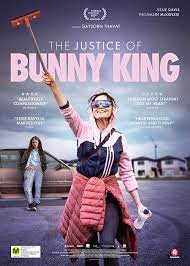
THE JUSTICE OF BUNNY KING
New Zealand, 2021, 101 minutes, Colour.
Essie Davis, Thomasin McKenzie.
Directed by Gaysom Thavat.
While watching this film, the audience may be wondering whether any justice is possible for Bunny King. She is an ordinary citizen, fallen on very hard times, continually making mistakes and alienating authorities, desperate to be with her children.
This is a New Zealand film, an authentic atmosphere in a New Zealand city, ordinary streets, vehicles, the men and women who (before it became less fashionable to carry cash) clean the windows of cars stopped at traffic lights, hoping for some kind of remuneration. There is also the Maori neighbourhood. And, there are foster homes, and offices of caregivers and the bureaucrats who run departments.
Essie Davis gives a very striking performance as Bunny King, on the one hand having to live the consequences of her mistakes, on the other hand very determined, using a variety of means and lies to be with her children. Bunny lives with her sister and brother-in-law and niece, the niece, Tonyah, played by Thomasin McKenzie.
Bunny comes across difficulties at home, her father abusing her his daughter, Bunny’s severe reaction, even to persuading Tonyah to leave the house with her and become involved in her various escapades as she tries to recover her children, buying birthday presents for her little girl but discovering that the children have been removed with no address available for Bunny. Which lead to something of a siege of the department office, police, guns.
There is pathos for Bunny even while we realise that her behaviour is frustrating for herself and for everyone else. We see her children, little girl with disability, a teenage boy. There are some sympathetic carers, there are some harsh people administering the letter of the law.
And, there are all the implications of Tonyah’s story, especially Tonyah eventually accusing her mother not believing her when she told the truth about her father.
There is no definite end for the film. Will Bunny learn from her experiences and be rejoined with her children – or not?
- A New Zealand story, universal story?
- The New Zealand setting, the city, streets and buildings, homes, the Maori community, social work, foster homes? The musical score?
- The title, the focus on justice, for individuals, despite their handicaps and failings, the harshness of bureaucracy?
- Bunny King’s story, her past, marriage, accident, her children, the disability of her daughter, the children being taken from her, trying to get jobs, cleaning car windows in the streets, her friends and associates, her visits to the authorities, the supervisors, the restrictions on meeting her children, the fostering, her intruding in desperation to see the children, this coming back on her, the supervisor, the possibility of getting a home, her Maori friends, pretending the home was her own, removing the pictures, the government visitor? The dress seller, getting clothes for her job interviews? Her being transformed? The encounter with the estate agent, going up to the apartment, his saying she wasn’t renting, her pointing out that he was hitting on her? Her later taking Tonyah and using this apartment?
- Her relationship with her sister, mother-in-law, niece, living in the house, doing the work, supporting the family? The bond with her sister but her sister’s neglect? The brother-in-law, tough, her seeing him abusing his daughter? Her reaction, accosting him, spray-painting the car, smashing the windscreen? Later stealing the car? The appeal to Tonyah, persuading her to go with her?
- Their time together, the planning for the birthday party, going to the shops, the box and stealing the extra goods? Finding the children gone? Not knowing where they were, going to the authorities, accosting them, a kind of invasion, talking on the phone, the police coming, the shooting, her being wounded, Tonyah and her participation, Tonyah’s decision?
- Bunny being taken out, the song, cheerful, acknowledging her mistakes, to make mistakes again? Possibilities?
- The story of Tonyah, at home, age, her parents, with her father, the abuse, her leaving, accompanying Bunny on the adventures, standing by her, and criticising her mother for not believing her? The portrait of her parents, parenting, inadequacies, abuse?
- The picture of the children, their ages, in care, the little girl, disability, bonds with her mother? The son, teenage, talking with his mother?
- The Maori community, friendly, cleaning the windows, inviting her to the house and meals, the matriarch supporting her in pretending the house was hers?
- The portrait of the authorities, those sympathetic, those unsympathetic and bureaucratic?
- A glimpse of the troubles of ordinary people, their failings, their needs, issues of justice?